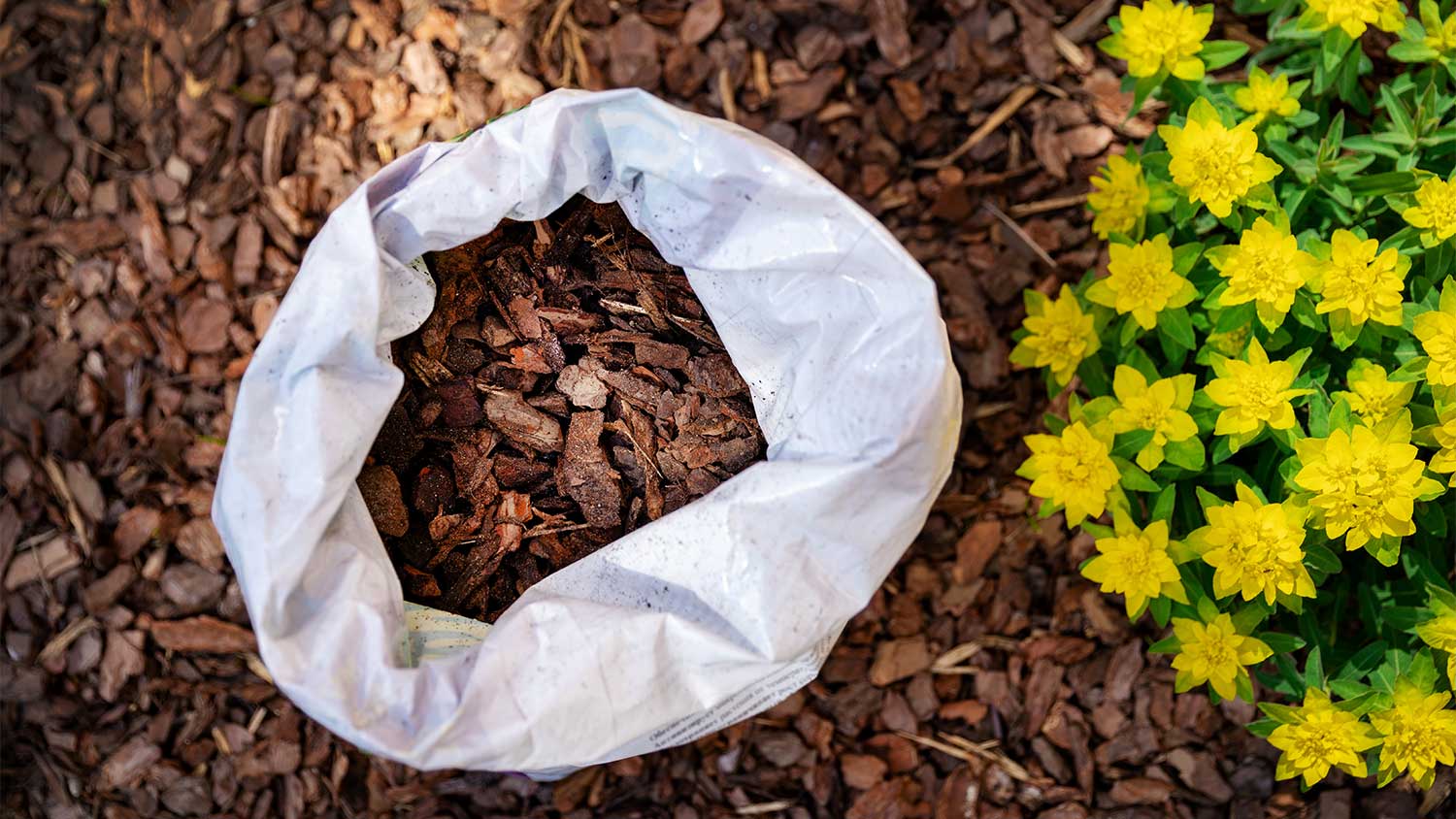
Find out the average mulch delivery and installation cost, plus key factors that impact your price. Learn how to budget, compare options, and save on your landscaping project.
Find out how to get the best-looking yard on the block


A local mulch delivery service can help you choose the right mulch based on factors like your soil needs, climate, plant types, and how you use each area of your yard.
Organic mulches like compost, wood mulch, and leaf mold improve soil health as they break down, but decompose quickly and need to be replenished frequently.
Rubber mulch is durable and low-maintenance for play areas, but it isn’t suitable for gardens since chemicals can leach into the soil and harm plants.
Stone chipping, shell, and rubber mulch are long-lasting options for pathways, seating areas, and play spaces, but they’re difficult to remove, can overheat soil, and may contaminate growing areas.
Mulch can have many uses in your yard, from controlling weed growth and maintaining moisture levels to making a play area softer and safer for the kids. The benefits of various types of mulch include protecting plant roots from extreme heat and cold, improving soil quality, and adding color and texture to bare areas.
This guide walks you through the different mulch types, their characteristics, and what they're best suited for so you can choose the right one for your property.
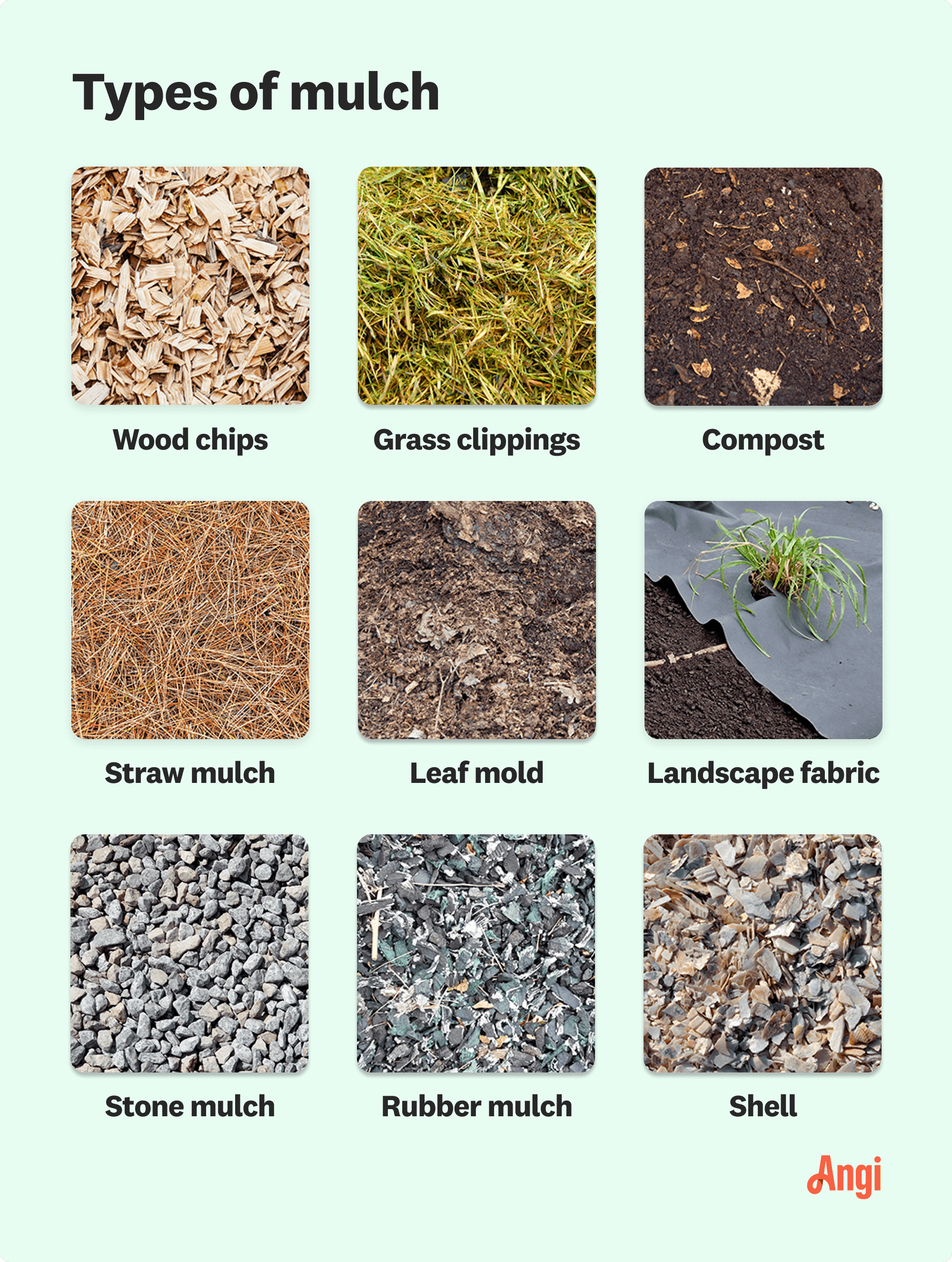
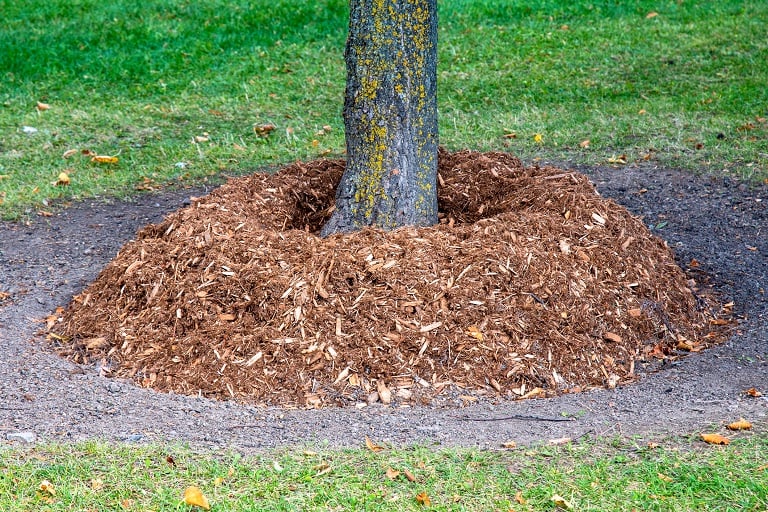
Hardwood and softwood chips or bark make up wood chip mulch. It's often made of waste products from paper and furniture production industries, so as long as it's from sustainably sourced wood, it's a solid, eco-friendly choice for mulch. Once you know how to mulch around trees, laying down wood chips is a quick and easy weekend project to freshen up your landscaping.
Waste wood chips are dried and aged, so you can apply this mulch straight onto your garden beds. If you're lucky enough to score free fresh wood mulch from your local municipality, either let it rot down for a year or only apply it to pathways. Green wood, or wood that has been freshly cut and hasn't dried or cured yet, draws a lot of nitrogen from the soil as it starts to decompose. Letting it sit for a year ensures it passes the nitrogen-gathering stage so that when you eventually apply it to your beds, it slowly releases its stored nitrogen back into your soil.
Also, make a note of what type of trees are in your mulch. Pine is acidic and takes longer to decompose, but is better suited to use around large, established trees and shrubs. Hardwood chippings are more neutral and well-suited to plants and trees of any type and size.
| Pros of Wood Chip | Cons of Wood Chip |
|---|---|
| Helps control weeds | Prone to fungal growth |
| Protects plant roots from extreme temperatures | May attract termites |
| Helps maintain soil nutrients | Decomposes quickly |
Best used for: Annual plant beds, play areas, around trees
Grass clippings and general shredded garden waste pull double-duty as free mulch. In thin layers, garden waste makes a good, nutrient-rich mulch for flower and vegetable beds. Apply it at the end of the growing season by just tilling or digging it in. Remember not to use clippings from grass that's been sprayed with herbicides, pesticides, or fungicides to avoid contaminating your garden beds.
| Pros of Grass Clipping | Cons of Grass Clipping |
|---|---|
| Adds vital nutrients back into soil | Can spread weeds or lawn diseases |
| Reduces yard waste | Clumps when wet |
| Inhibits weed growth | Not visually appealing |
Best used for: Flower beds, vegetable gardens

Compost produced from your own kitchen scraps is fantastic nutrient-dense mulch for your garden beds—and it's free. It costs you nothing to make your own mulch this way and reduces the waste you send to landfills, so it's great for the environment, too. Due to its organic content and abundance of nutrients, compost is considered one of the best mulches for vegetable gardens.
Composted or rotted-down manure from farmyard animals like pigs, horses, cows, and sheep is also fantastic and high in nitrogen. Both of these mulches slowly release their nutrients into the soil as they decompose. When you dig the top layer in at the end of the season, it helps to condition and improve the soil structure, creating a light, open structure that allows for the free movement of water and air.
A thick layer of compost or manure also suppresses weeds and acts as insulation, warming the soil earlier and keeping heat in longer than bare earth, helping to extend the growing season.
| Pros of Compost | Cons of Compost |
|---|---|
| Eco-friendly | Needs to be replaced/refreshed frequently |
| Nutrient-rich | May have an unpleasant odor |
| Affordable | Attracts pests |
Best used for: Raised garden beds, vegetable gardens
Straw from wheat, barley, and oats makes a fantastic temporary mulch. It decomposes quickly and doesn't add much in the way of nutrients, but as it gets worked into the soil, it improves structure and drainage. Used around soft fruits and vegetables like strawberries and zucchini, it keeps the delicate fruits off the floor and away from the worst of the moisture and mud that causes rotting. Straw mulch also conserves water and deters slugs and snails.
While mulch delivery and installation costs depend on weight and quantity, straw mulch carries the lowest cost because it weighs very little. In fact, because it's so easy to move, you may be able to transport it and apply it yourself.
| Pros of Straw | Cons of Straw |
|---|---|
| Decomposes slowly | Attracts pests |
| Easy to spread and rake up | May be treated with pesticides or herbicides |
| Protects plants from cold temperatures | Blows around easily |
Best used for: Newly seeded lawns, perennial beds
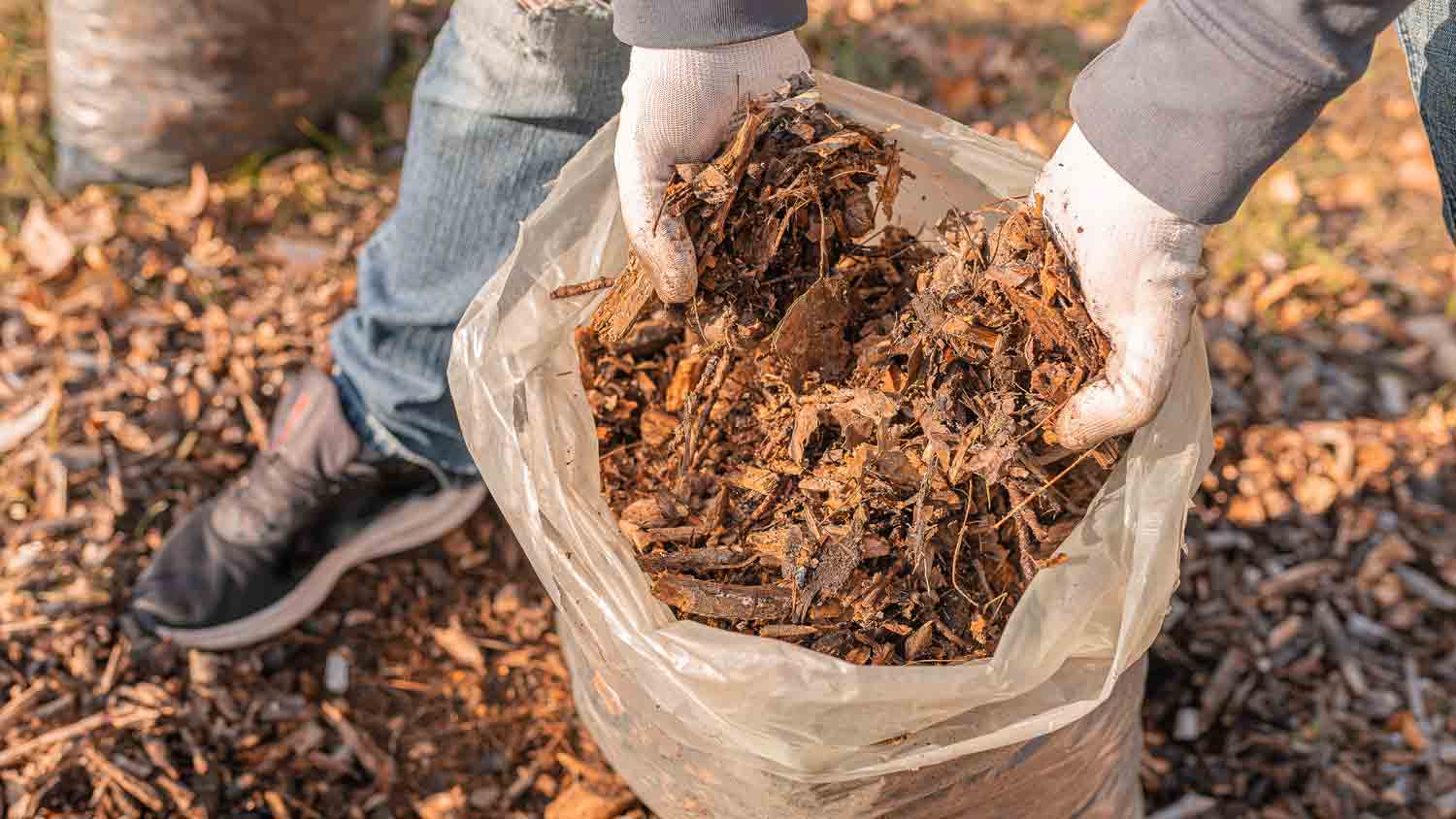
Leaf mold is high in nutrients, but it has to be well-rotted. Fresh leaves can damage plants and harbor insects, fungi, and pathogens. Rake up all of your fallen leaves, or mow them to shred them along with your grass clippings. Place them in hessian or plastic bags with lots of holes poked in to let water through, then let them sit for at least a year.
After this, you'll have rich leaf mold mulch that your garden will love. Like other organic mulches, leaf mold slowly releases nutrients as it breaks down and improves soil structure when you till it into the earth at the end of the growing season.
| Pros of Leaf Mold | Cons of Leaf Mold |
|---|---|
| Increases water retention | Needs to be aged |
| Improves soil structure | Decomposes quickly |
| Encourages earthworms and beneficial organisms | Low in nutrients |
Best used for: Vegetable gardens, raised plant beds
The use of landscape fabrics in plant beds allows water and air through but helps suppress weeds. They're not particularly attractive and, alone, are not terribly effective for long. But landscapers usually use these weed-suppressant fabrics in combination with a more appealing top layer such as gravel.
Landscape fabric keeps the gravel or other substrate separate from the soil. So, if you ever decide to get rid of the graveled decorative area, you can do so without having to remove a layer of topsoil because it's contaminated by inorganic mulch particles.
| Pros of Landscape Fabric | Cons of Landscape Fabric |
|---|---|
| Suppresses weeds | Inhibits effective watering |
| Insulates soil | Difficult to install |
| Helps prevent erosion | Usually needs to be covered with another mulch material |
Best used for: Pathways, around mailboxes, foundation plantings
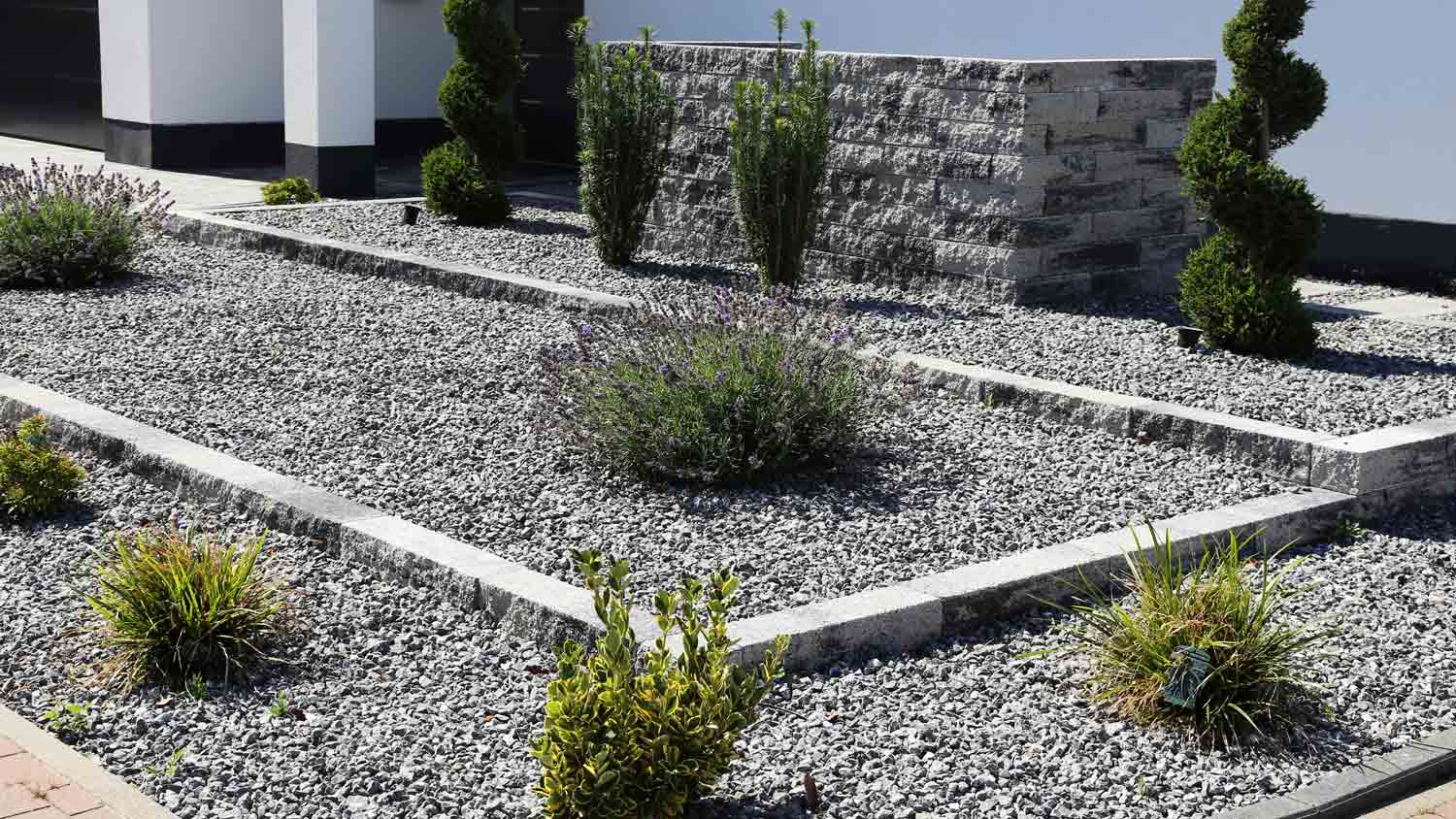
Stone chippings make an attractive mulch alternative for pathways and otherwise barren areas where not much grows. While marble chips and other stone mulches may look striking, you shouldn’t use them around plants, as they can cause heat stress from reflecting heat and ground heating, damaging the foliage and the root systems.
When it comes to deciding between mulch and rock, keep in mind that stone chip mulches also don't retain water well. If there's no landscaping fabric between the chippings and the soil, removal is problematic. You'll need to get a local landscaper to remove and replace the topsoil to get rid of the stone entirely.
| Pros of Stone Chipping | Cons of Stone Chipping |
|---|---|
| Improves drainage | May overheat soil |
| Visually appealing | Difficult to remove |
| Durable | Easily compacted into soil |
Best used for: Pathways, between or around plant beds
Rubber mulch is gaining in popularity as a mulching option because it diverts tires from landfill, durable, low maintenance, and is inexpensive. And while it makes an excellent mulch for kids' play areas, it's not advisable for use in the home garden.
Rubber mulch releases compounds and heavy metals that leach into the soil, harm your plants, contaminate your growing space, and eventually make their way into the groundwater. Before laying down rubber mulch, carefully consider where it’s going to be used and ensure it’s not near where you want plant growth.
| Pros of Rubber Mulch | Cons of Rubber Mulch |
|---|---|
| Affordable | Contaminates soil |
| Does not need to be replaced | Not environmentally sustainable |
| Durable | May have strong odor |
Best used for: Play areas, high-traffic walkways
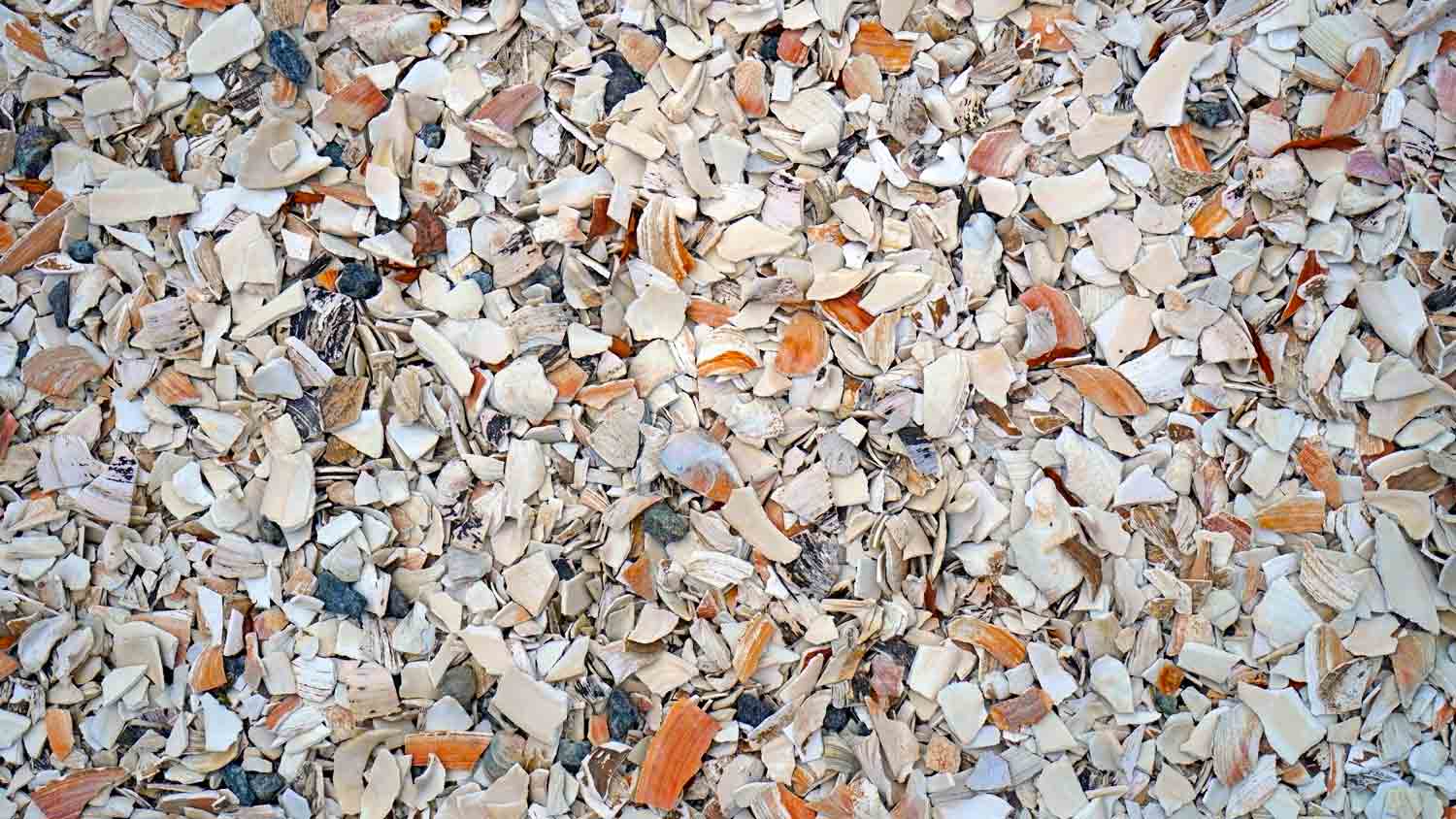
Crushed shells, if sourced sustainably, are a great eco-friendly mulching option for pathways and seating areas. Shells have a reasonably long life span, but they break down as you walk on them, so you'll eventually need to add more. Plus, the shells tend to migrate on your boots or slowly work their way into the beds alongside the path, which isn't a significant issue, but it does deplete them over time.
This is another mulch that needs separating from the soil with landscape fabric if you use it on beds or it's difficult to remove cleanly.
| Pros of Shell | Cons of Shell |
|---|---|
| Long-lasting | Overheats easily |
| Increases water retention | Expensive |
| Suppresses weeds | Difficult to remove |
Best used for: Pathways, courtyards, seating areas
Which mulch you should pick isn't always obvious. Choosing the right mulch can help your yard flourish, but the wrong one can cause serious issues and even kill off your plants. There are many factors to consider, including whether you want to grow plants through the mulch, create a decorative area in an otherwise bland piece of yard, rejuvenate soil, or create a play area. Your climate also has a significant impact on which mulch you pick, as does your level of commitment to environmental sustainability.
Once you've decided which type of mulch you want, you'll need to figure out how much mulch you need. You'll also need to prepare your landscape for the mulch application, although you can always hire a mulch delivery pro near you to take care of that (and the whole mulching process) for you. You may find that the cost of landscaping is well worth saving yourself the work.
I have nothing but great things to say about Marvelous Painting! Marius was quick to respond and initially gave me a quote based on my home listing, then followed up with an in-person visit to confirm—and his price stayed the same. He even offered us a military discount, which we truly...
I had a great experience with Jackrete. The were prompt and organized in the estimate phase and provided a very detailed and accurate estimate. I had actually contacted them when I purchasing the house and my inspection report indicated repair was needed for the concrete gutter system. The...
Noel contacted me immediately and was in my home within 30 minutes to do an estimate. We hired him to come out 3 days later to trim heavy branches from 3 very large trees that were overlapping our roof and our fence. They were here exactly on time, got right to work, and did a fantastic...
Outstanding job! Hardworking and thorough - they did a great yard clean up, trimmed bushes, put down mulch, and did the first lawn mowing of the season. Prompt to return calls and completed the task on time as promised. I was impressed enough to hire them to continue to provide ongoing...
They have mowed the yard for several years. This fall they spread mulch and trimmed our hedges and shrubs. A little expensive, but worth the money. They really do an excellent job. Our lawn looks great.
Everybody iknows their business from products thru installation . Great job.
The entire team was full of energy and did an AWESOME job! We are very please with everything they did from the Forester Mulching and especially the re-grading of the property. They showed up from an hour away on time everyday always with a smile on their faces. Worked after we had some...
Plumber came the day after I called and found and fixed the leak quickly. This is the fourth time I've used Greenlee and will call them again if I need any plumbing work done in the future.
Very communicative and easy to work with. They did a wonderful job of weed-treating and mulching multiple large beds in my yard, as well as mowing and edging the lawn. I look forward to working with them more in the future.
Called and gave an estimate in just a couple of days. Kept us informed through the project. Completed today and did excellent work.
From average costs to expert advice, get all the answers you need to get your job done.

Find out the average mulch delivery and installation cost, plus key factors that impact your price. Learn how to budget, compare options, and save on your landscaping project.
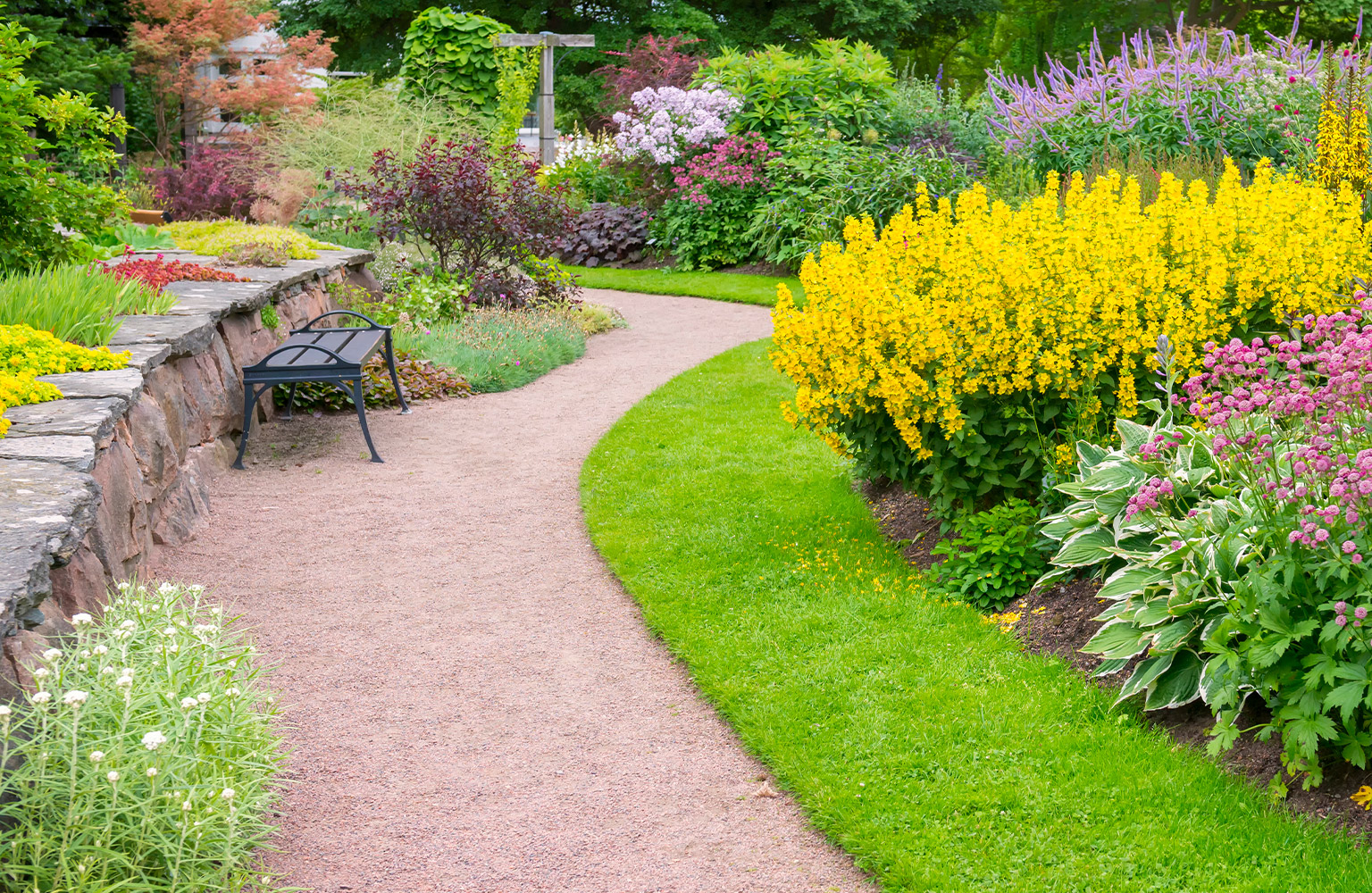
Discover the average sand delivery cost, key price factors, and tips to save on your next project. Get transparent, up-to-date estimates for sand delivery.
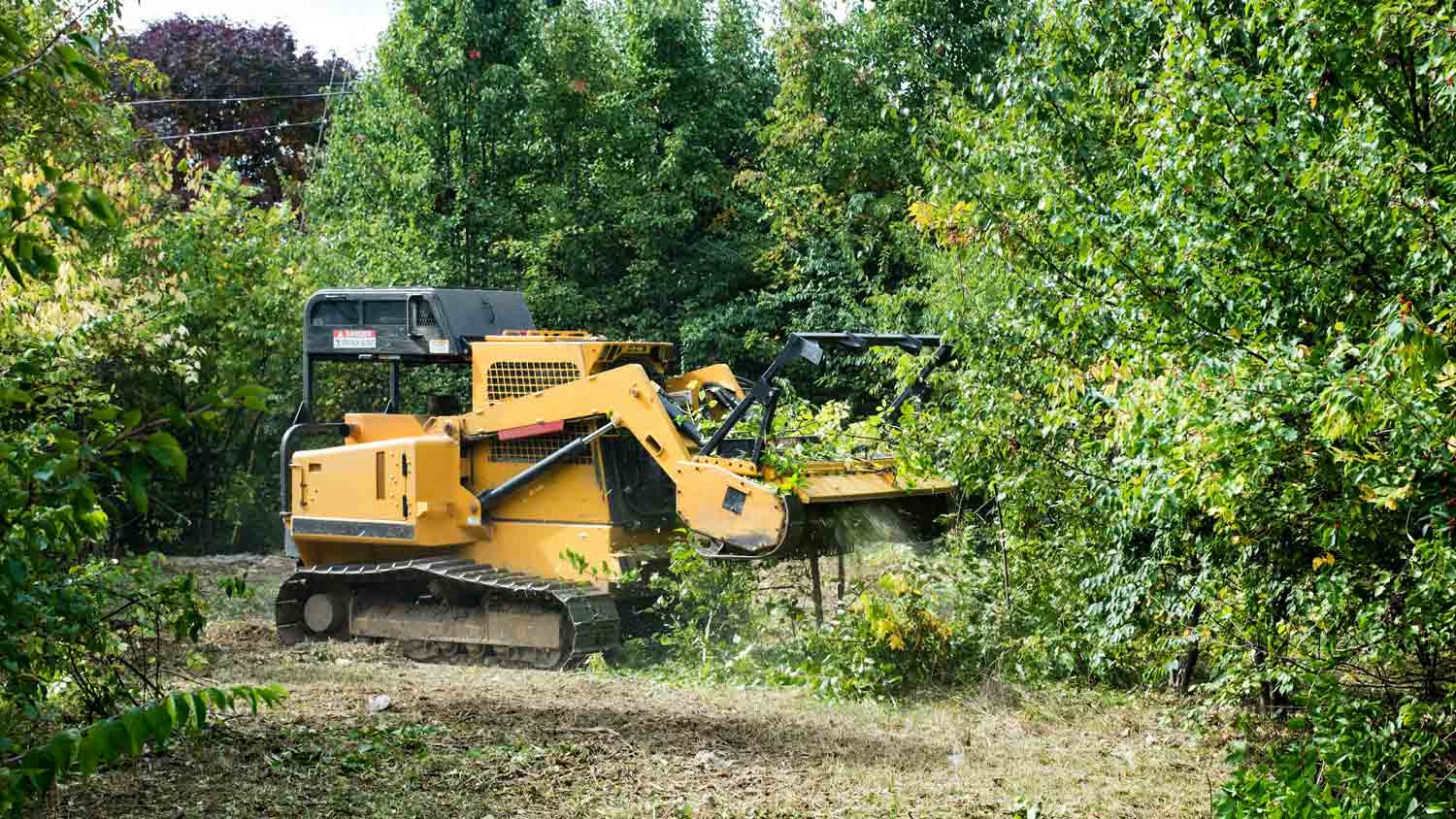
Discover the average forestry mulching cost, including per-acre and hourly rates, plus key factors that impact your total price. Get expert tips to save on your project.

Knowing who to hire for mulch installation can seem tricky at first. Read this guide to figure out which companies are your best options for a mulching project.
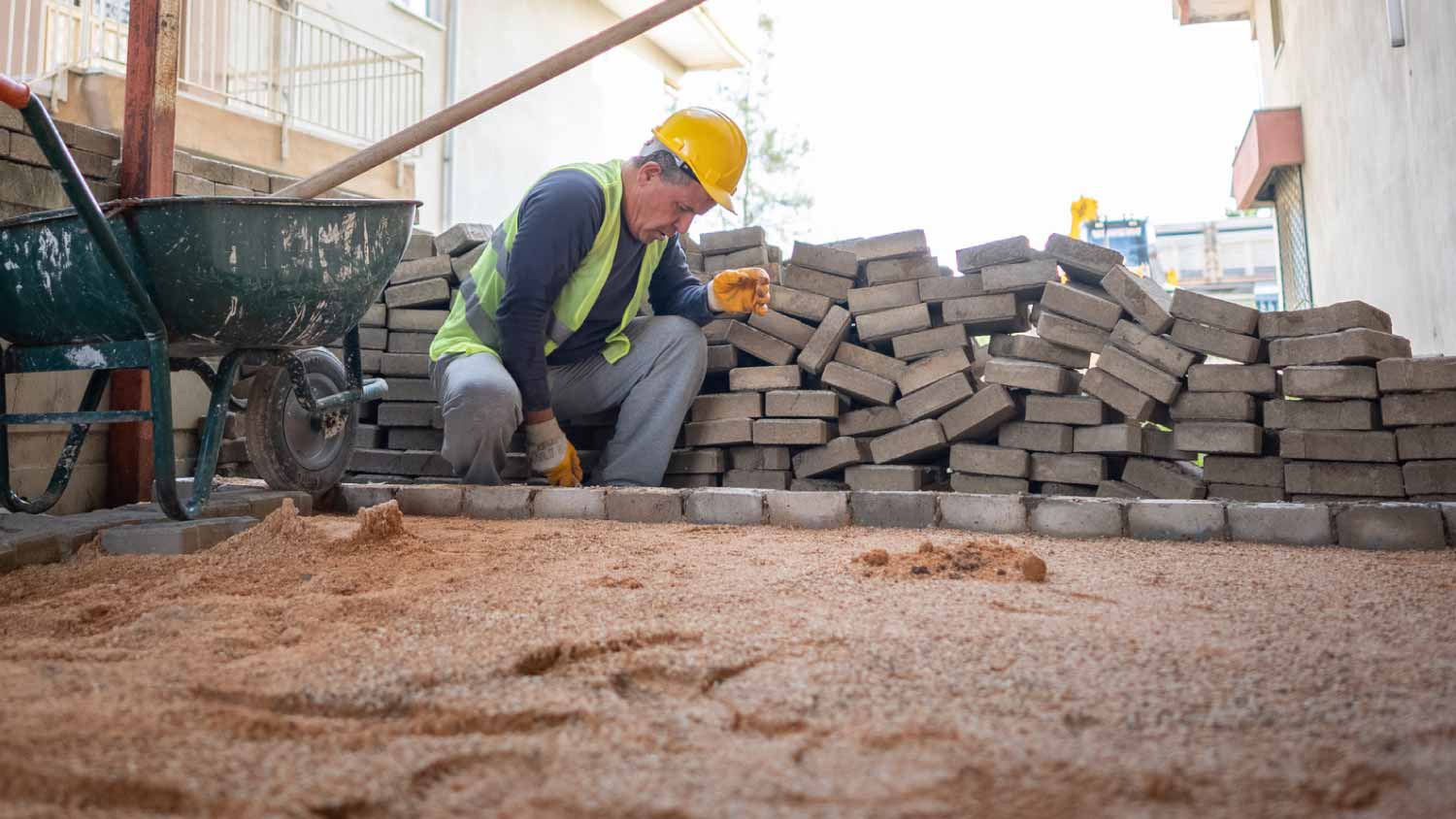
This calculator will help you estimate how much sand you’ll need to complete your hardscape project.
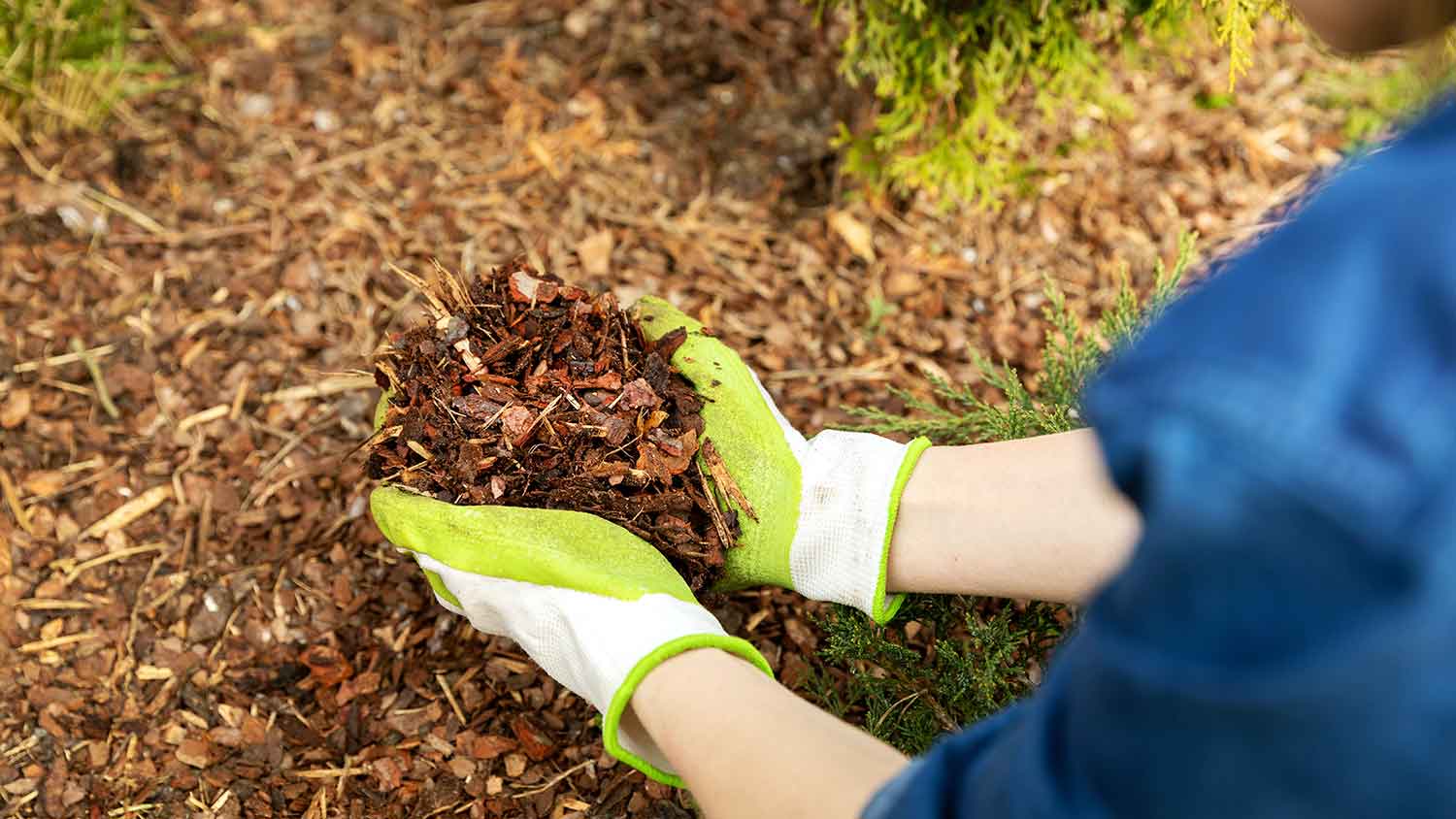
Discover mulch removal cost estimates. Discover what influences pricing, compare DIY vs. professional services, and find expert tips to save on your mulch removal project.